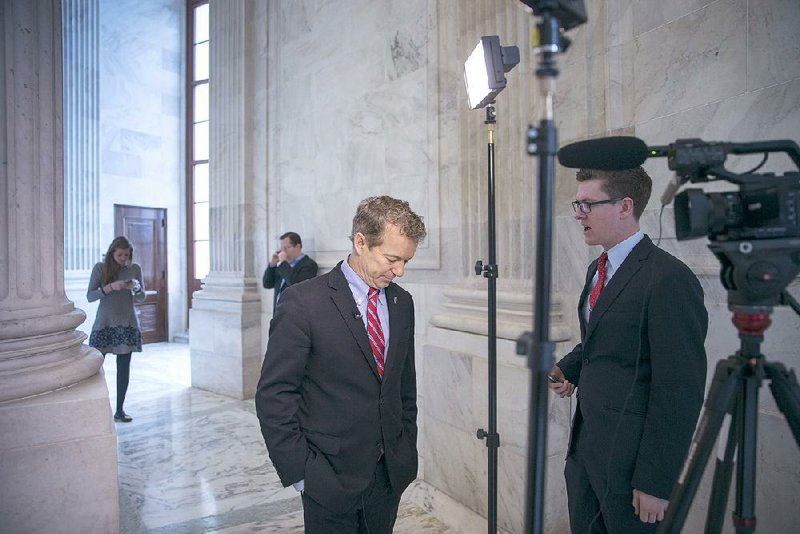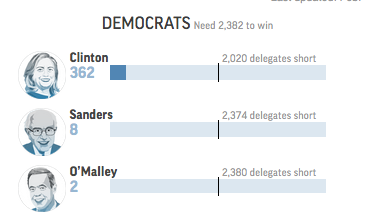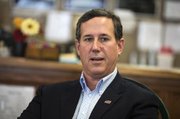The Republican presidential field narrowed Wednesday after Sen. Rand Paul of Kentucky and former Sen. Rick Santorum of Pennsylvania suspended their campaigns.
RELATED ARTICLES
http://www.arkansas…">In LR, Trump reproves Cruz, 'political people' http://www.arkansas…">Clinton, Sanders tout 'progressive' resumes http://www.arkansas…">Trump event draws fans, gawkers http://www.arkansas…">Arkansas native Jennings Clinton press aide in state
Paul said he will return to Kentucky to run for re-election to his Senate seat.
"It's been an incredible honor to run a principled campaign for the White House," Paul said in a statement. "Today, I will end where I began, ready and willing to fight for the cause of liberty."
Vowing to continue his drive for less-intrusive government and more restrained foreign policy, Paul said he looks forward to earning another Senate term representing Kentucky.
Paul's campaign aides said the candidate decided to drop out after a fifth-place finish in Monday's Iowa caucuses.
In a telephone interview Wednesday, Paul said he didn't have an explanation for the results.
"I don't really have an absolute answer for what went on with the election and why people make their choices," Paul said. "But I do think our voice was an important one, and I think as people look backwards they are going to say they were happy to have my voice in the debate."
Asked whether he intends to endorse another candidate for president, Paul, a 53-year-old ophthalmologist, replied, "No."
Santorum, 57, who won the 2012 Iowa caucuses but finished 11th out of the 12 candidates in Monday's contest, confirmed in an interview on Fox News that he is "suspending our campaign as of this moment."
In a final comment on the Republican race, Santorum threw his support behind Sen. Marco Rubio of Florida. He described Rubio, 44, as a "born leader" and praised his "optimistic" message.
Rubio "is the new generation and someone that can bring this country together," Santorum said.
The withdrawals of Santorum and Paul occurred less than a week before the New Hampshire primary, the next round in the Republican and Democratic nomination contests.
After suspending his campaign, Paul returned to Capitol Hill for votes in the Senate, where he will continue his term, with eyes on his re-election bid in Kentucky.
"I will continue to carry the torch for Liberty in the United States Senate and I look forward to earning the privilege to represent the people of Kentucky for another term," Paul said in his statement.
Paul was elected to the Senate in 2010 as part of the GOP's tea party wave and tangled often with GOP leaders.
Paul began his presidential candidacy determined to improve the Republican Party's appeal with younger voters and to upend the way Washington works. But his appeals to reject U.S. political dynasties and "to take our country back" were ultimately drowned out by billionaire businessman Donald Trump and U.S. Sen. Ted Cruz of Texas, who won Monday's caucuses.
Paul's noninterventionist foreign policy separated him from the other Republican candidates, who courted more voters by promising a robust U.S. role in curbing terrorism around the globe. Paul was low on campaign funds, too -- he had just more than $1 million at the start of 2016, according to campaign-finance records.
A first-time candidate for national office, Paul also found it difficult to persuade the supporters of his father -- former Rep. Ron Paul of Texas, who sought the Republican presidential nomination in 2008 and 2012 -- to back him with enthusiasm.
"His decision to move to the middle and support a number of moderate Republicans in the 2014 elections, that sent us a real signal about the application of his ideology," said Drew Ivers, Ron Paul's 2012 Iowa chairman, who did not endorse Rand Paul.
"He muddled on his message, tried to get the left, and I told him it would backfire. ... I just saw someone trying to do too much and be too many things to too many people. His name is Paul, I told him. You can't defy gravity."
After qualifying for five prime-time debates -- and enduring Trump's suggestion that he not bother running anymore -- Paul was dropped from the sixth main debate for a spot at the "undercard" bout. He was invited back for the seventh and final prime-time debate before the Iowa caucuses.
In his statement Wednesday, Paul expressed confidence that his campaign, while unsuccessful, offered Republicans an alternative by focusing on issues he thinks are crucial to attracting minorities and young people to the party.
"Across the country thousands upon thousands of young people flocked to our message of limited government, privacy, criminal justice reform and a reasonable foreign policy," he said. "Brushfires of Liberty were ignited, and those will carry on, as will I."
Speaking to reporters in New Hampshire, Rubio commended Paul for running "a good race" and wished him luck in his re-election bid.
"Rand is someone I disagree with on a lot of issues, but as I said the other night at the debate ... he believes strongly in what he stands for, and I respect that," Rubio said. "He's a true believer on issues of limited government and the liberty issues and I respect it for him for it."
Rubio also said that he looks forward to teaming up with Santorum and that he has "tremendous respect for Rick."
He added that Santorum "has a message" for "Americans who work hard with their hands every day to make a living and move their families forward."
Santorum entered the race in May as a heavy underdog. His long-shot status kept him off the mainstage in all of the presidential debates.
After his victories in 2012 -- he took 10 other states after victory in Iowa before ultimately losing the nomination to Mitt Romney -- he entered a more powerful and diverse 2016 field, causing his campaign to struggle.
He is among the nation's most prominent social conservatives, having dedicated much of his political career to opposing same-sex marriage and abortion rights, while advocating for conservative Christian family values.
Information for this article was contributed by Robert Costa and Sean Sullivan of The Washington Post; by Laurie Kellman, Adam Beam, Bill Barrow, Steve Peoples and staff members of The Associated Press; and by Joshua Green of Bloomberg News.
A Section on 02/04/2016




